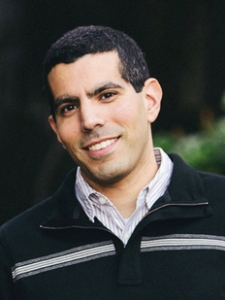Sep 5 2013
Challenges are on the horizon for urban areas facing expectations of higher temperatures in the future. The situation could be particularly acute in the arid climate of the Southwest, where urban heat is already trending upward.
 ASU engineer Mikhail Chester is teaming with colleagues at UCLA to explore ways that building techniques and infrastructure design can better shield people from rising urban heat. (Photo by: Jessica Slater/ASU)
ASU engineer Mikhail Chester is teaming with colleagues at UCLA to explore ways that building techniques and infrastructure design can better shield people from rising urban heat. (Photo by: Jessica Slater/ASU)
An Arizona State University engineer, along with a physician and an urban planning expert at the University of California, Los Angeles (UCLA), is undertaking research to help cities take steps to lessen the impact of rising temperatures.
Mikhail Chester, an assistant professor in the School of Sustainable Engineering and the Built Environment, one of ASU’s Ira A. Fulton Schools of Engineering, will team with physician David Eisenman, a professor in the UCLA Division of General Internal Medicine and Health Services Research, and Stephanie Pincetl, an adjunct professor and director of the UCLA Center for Sustainable Communities at the university’s Institute of the Environment and Sustainability.
A National Science Foundation grant providing $480,000 over the next four years will support their study of two sprawling urban areas considered especially vulnerable to an increasing number of heat waves: the Phoenix/Maricopa County and Los Angeles County metro areas.
Socio-economic and health status have largely defined the scope of heat vulnerability studies, Chester explains. At-risk communities are characterized by the poverty levels of residents, who often have uncertain access to water and electric utilities, are linguistically isolated, due to a lack of proficiency in English, and often are surrounded by infrastructure that leaves them more exposed to heat.
In these communities, the elderly and those living with debilitating physical afflictions or chronic diseases are even more at risk.
The ASU-UCLA research team will focus on an aspect that has received scant attention as a way to reduce the impact of excessive heat on those vulnerable populations: “urban form,” primarily building construction practices and public infrastructure.
The goal is to devise precise methods of determining the effectiveness of specific construction practices and infrastructure development that could be implemented to better protect people from threatening levels of prolonged heat.
The researchers will weigh the benefits of such things as building weatherization techniques, rooftop solar-energy technology, tree planting and public cooling structures and spaces.
Their aim is to produce a methodological framework – integrating socio-economic and built-environment factors – that local governments can use as a sound practical basis for investment strategies to reduce heat exposure.
The team plans to present its findings to government and community leaders in Maricopa and Los Angeles counties, and to provide the information to other researchers and the public on an interactive, map-based website.
In addition, the researchers will produce educational materials to guide other engineers, social scientists, and medical and public health professionals in using the new methods for future projects to reduce the heat vulnerability of other communities and urban areas.